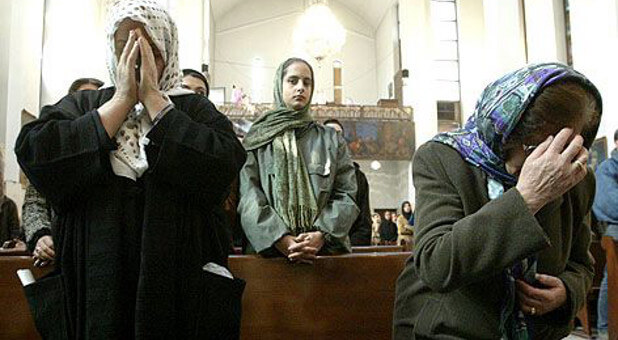As Christmas approaches, it is worth remembering the historical roots of Christians in the Middle East, and recognizing just how much the plight of Middle East Christians has deteriorated.
Over 2,000 years ago, Jesus was born in Bethlehem, inspiring a faith that would spread from Jerusalem to other parts of the Levant, including territories in modern Israel, Lebanon, Syria, Iraq, Jordan, and Egypt. Christianity flourished as one of the major religions in the Middle East until the Muslim conquests of the 7th century.
Despite Muslim domination of the region, Christians comprised an estimated 20 percent of the Middle East population until the early 20th century. Today, however, Christians make up a mere five percent of the Middle East and their numbers are fast dwindling. Writing in the Winter 2001 issue of Middle East Quarterly, scholar Daniel Pipes estimated that Middle East Christians would “likely drop to” half of their numbers “by the year 2020” because of declining birth rates, and a pattern of “exclusion and persecution” leading to emigration.
The “Arab Spring” has only worsened conditions for the indigenous Christians of the Middle East. Like the Kurds, Middle East Christians are a stateless minority, struggling to survive in the world’s toughest neighborhood. But the Kurds at least have enjoyed partial autonomy in Iraqi Kurdistan since 1991 and most of them are Sunni Muslim, making it easier for them to survive in the Muslim-dominated Middle East.
Christians, on the other hand, are a religious minority that controls no territory and is entirely subject to the whims of their hosts. These host countries—with the exception of Israel—each offer a grim future to Middle East Christians.
In Egypt, the fate of Christians lies with Mohammed Morsi, who used to be a leading member of the Muslim Brotherhood, and who has lost no time in trying to introduce Sharia law to Egypt. Home to one of the oldest Christian communities in the world, Egypt also has the largest Christian population in the Middle East, totaling 8-12 million people.
But because Christian Copts make up only about 10-15 percent of Egypt’s estimated 80 million people, they have for decades lived in fear as second-class citizens, subjected to attacks on churches, villages, homes, and shops; mob killings; and the abduction and forced Islamic conversion of Christian women compelled to marry Muslim men. If such abuse took place under the staunchly secular regime of Hosni Mubarak (which had banned the Muslim Brotherhood), what can the Christians expect under the rule of an Islamist like Mohammed Morsi?
In Lebanon, Christians represent a bigger portion of the population, so their fate is for now less precarious than that of their Egyptian coreligionists. But, their long-term prospects are worrisome. The Christian population is estimated to have dropped from over 50 percent (according to a 1932 census) to about 40 percent.
Over the last few years, the de facto governing power in Lebanon has become Hezbollah, the radical and heavily-armed Shiite movement sponsored by Iran. With all of the spillover violence and instability produced by the Syrian civil war and/or the next war that Hezbollah decides to start with Israel, the emigration of Christians out of Lebanon will probably only increase in the coming years, leaving those who stay increasingly vulnerable.
In Syria, 2.5 million Christians comprise about 10 percent of the population and enjoyed some protection under the secular and often brutal regimes of the Assad dynasty. But when the Syrian civil war eventually brings down the Assad regime and Alawite rule, the past protection of Christians may be the cause of their future persecution by the next regime and/or by the Syrian Sunnis who suffered under the Alawites. Christians have already been targeted and killed by rebels, and the sectarian chaos and violence that will likely prevail in Assad’s wake will only increase the number of Christians fleeing Syria.
In Iraq, the bloody aftermath of the 2003 invasion demonstrated how dangerous life can become for a Christian minority when a multi-cultural society in the Middle East explodes into sectarian violence. By 2008, half of the 800,000 Iraqi Christians were estimated to have left, rendering those remaining even more insecure.
In 2010, Salafist extremists attacked a Baghdad church during Sunday Mass, killing or wounding nearly the whole congregation. Such incidents turn any communal gathering into a potential massacre, forcing Christians across the Middle East to ask the ultimate question of faith: “Am I prepared to die for Christian worship?”
The Arab Spring threatens to exacerbate matters in much of the Middle East as Islamists now either control the government or influence it enough to persecute Christians with impunity. As new Islamist regimes in the Middle East condone religious intolerance and introduce Sharia and blasphemy laws, the long-term trend for Christians in their ancestral lands will only grow bleaker.
The one bright spot is the state of Israel—“the only place in the Middle East (where) Christians are really safe,” according to the Vicar of St George’s Church in Baghdad, Canon Andrew White. Home to Christianity’s holiest sites and to a colorful array of Christian denominations, Israel has the only growing Christian community in the Middle East.
Because Israel is the only non-Muslim state in all of the Middle East and North Africa, it represents a small victory for religious minorities in the region, and serves as the last protector of freedom and security for Jews, Christians, Bahai, Druze, and others. Without Israel, how much more vulnerable would Christians in the Middle East become?
Noah Beck’s novel, The Last Israelis, published last July, highlights the vulnerabilities of religious minorities in the Middle East through the voice of a Christian Israeli Arab who serves on the Dolphin submarine alongside Israeli Jews.











































